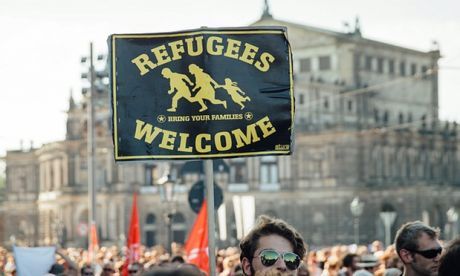Shared
You are here
Statement on the European refugee crisis

September 5, 2015
1. Europe is facing what has been called its “greatest refugee crisis since the Second World War”. Global levels of displacement due to war and persecution have reached horrific proportions. Some 13.9 million were displaced in 2014 alone. The numbers entering Europe in July were three times higher than a year earlier.
The largest source of refugees making the desperate journey to Europe is Syria. Here the civil war that started with the Assad regime’s attempt to crush the uprising that began in 2011 has been exacerbated by the rise of Islamic State. However, this can only be understood in the context of the disastrous invasion and occupation of Iraq, led by the US and Britain. This Western-led offensive, the devastation it caused and the attempt of the occupiers to use sectarian forces to stabilise the country paved the way for the sharpening of conflict across the region.
Afghanistan, another country invaded and occupied by Western forces in recent years, is a second major source of refugees. Here too, far from war bringing liberation it has brought about a humanitarian catastrophe and growing persecution. Other refugees come from East Africa, where Western intervention in the region’s conflicts has helped to establish some of the most militarised societies on the planet.
Some 80 percent of those displaced by war, persecution and impoverishment remain within developing countries. When a fraction of these refugees seek to escape to Europe they are met with police violence – the “jungle” camp in Calais, France; the 110-mile fence being built by Hungary on its border; or the naval operations led by Frontex in the Aegean and the Mediterranean that have ended up in tragedies with hundreds drowned.
And when some manage to cross all these barriers they are met with police operations that round them up in camps where they have to resort to rioting to break free from inhuman conditions. This has, for example, happened repeatedly in the concentration camp at Amygdaleza in Greece, where refugees have recently begun a hunger strike in protest at their conditions.
2. The crisis has shown the hypocrisy of the European Union’s supposed commitment to “free movement”. The counterpart of the creation of a single labour market within its borders is the creation of “Fortress Europe” – policed by the Frontex agency and defended with rhetoric no less racist than that of traditional European nationalism. Capitalism sucks in workers from all over the world to fuel its profits, but uses racism and immigration controls to divide workers and undermine their organisation and struggles.
The result in Europe has been fatal. Last week alone, almost 300 were lost on a boat off the Libyan coast; 71 migrants, four of them children, were found dead in a lorry in Austria; most recently, 12 Syrians drowned off the coast of Turkey, including two small Kurdish boys and their mother.
The climate of racism and Islamophobia, whipped up by mainstream politicians in recent years has allowed right-wing forces to capitalise on the refugee crisis. In Britain, Nigel Farage, leader of the UK Independence Party, warned that those fleeing might be “extremists from Isis or other jihadi institutions”. Marine Le Pen of France’s fascist Front National has called for the country to close its borders altogether. Hungary’s Viktor Orban has spoken of his country being “overrun” by refugees who, he complained are Muslim rather than Christian.
3. The response from many working class people across Europe has contrasted with that of their rulers. Some 20,000 assembled in Vienna, Austria, to welcome refugees. Thousands have protested against racism in Germany. Vast amounts of aid have been collected in workplaces and communities in Britain to be taken to camps in France. Without the support from local populations in Greece, Macedonia and Serbia the refugees from Syria would not have reached Budapest, clashing with police on the borders and at the train stations.
The response shows the scope for a challenge to the racist offensive across Europe. The kind of networks established by the coordinated anti-racist protests held internationally in March 2014 and March 2015 have played a role in mobilising in support of refugees.
4. We reject the racism directed towards those seeking to enter Europe. We call for the borders to be opened, for the humanitarian needs of the refugees to be met and for safe passage to be afforded to them to their chosen destination.
We condemn the policies of Fortress Europe and call for the disbanding of Frontex.
We call for the refugee camps to be shut down. We stand in solidarity with the struggles organised by migrants, who have protested against their persecution at Budapest rail station, in the camps at Calais and in Greece, and on the Hungarian border.
We support the range of anti-racist protests and other solidarity initiatives being organised across Europe.
5. As socialists we reject the idea that refugees or migrants are a threat to the interests or living standards of working class people or that, as is often said, “We should look after our own first”. On the contrary those responsible for inflicting austerity, cutbacks, unemployment and homelessness on working people are also the people responsible for the refugee crisis. We say it is in the interests of workers everywhere to oppose all attempts by our rulers to divide and rule, to welcome refugees and to struggle alongside them for a decent life for all.
This is shared from the International Socialist Tendency
Section:
Topics:










